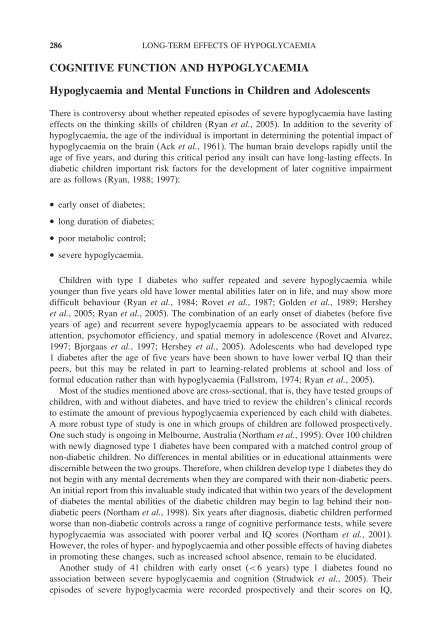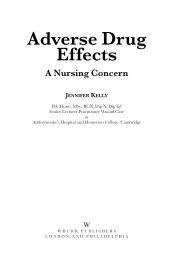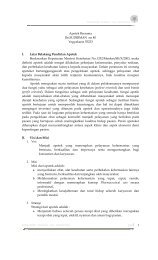- Page 2 and 3:
Hypoglycaemia in Clinical DiabetesS
- Page 4 and 5:
Hypoglycaemia in Clinical DiabetesS
- Page 6:
ToEmily, Ben and Marc
- Page 9 and 10:
viiiCONTENTS13 Long-term Effects of
- Page 12 and 13:
ContributorsProfessor Stephanie A.
- Page 14 and 15:
1 Normal Glucose Metabolismand Resp
- Page 16 and 17:
NORMAL GLUCOSE HOMEOSTASIS 3Box 1.2
- Page 18 and 19:
Fed state (Figure 1.1b)EFFECTS OF G
- Page 20 and 21:
COUNTERREGULATION DURING HYPOGLYCAE
- Page 22 and 23:
COUNTERREGULATION DURING HYPOGLYCAE
- Page 24 and 25:
HORMONAL CHANGES DURING HYPOGLYCAEM
- Page 26 and 27:
HORMONAL CHANGES DURING HYPOGLYCAEM
- Page 28 and 29:
PHYSIOLOGICAL RESPONSES 15hormones.
- Page 30 and 31:
PHYSIOLOGICAL RESPONSES 17Figure 1.
- Page 32 and 33:
PHYSIOLOGICAL RESPONSES 19We do not
- Page 34 and 35:
REFERENCES 21NORMAL GLUCOSE HOMEOST
- Page 36 and 37:
REFERENCES 23Hamilton-Wessler M, Be
- Page 38 and 39:
2 Symptoms of Hypoglycaemiaand Effe
- Page 40 and 41:
SYMPTOMS OF HYPOGLYCAEMIA 27appeare
- Page 42 and 43:
SYMPTOMS OF HYPOGLYCAEMIA 29aware o
- Page 44 and 45:
SYMPTOMS OF HYPOGLYCAEMIA 31Table 2
- Page 46 and 47:
SYMPTOMS OF HYPOGLYCAEMIA 33frequen
- Page 48 and 49:
SYMPTOMS OF HYPOGLYCAEMIA 35Figure
- Page 50 and 51:
ACUTE HYPOGLYCAEMIA AND COGNITIVE F
- Page 52 and 53:
ACUTE HYPOGLYCAEMIA AND COGNITIVE F
- Page 54 and 55:
ACUTE HYPOGLYCAEMIA AND COGNITIVE F
- Page 56 and 57:
ACUTE HYPOGLYCAEMIA AND EMOTIONS 43
- Page 58 and 59:
REFERENCES 45Bremer JP, Baron M, Pe
- Page 60 and 61:
REFERENCES 47McAulay V, Deary IJ, F
- Page 62 and 63:
3 Frequency, Causes and RiskFactors
- Page 64 and 65:
FREQUENCY OF HYPOGLYCAEMIA 51Box 3.
- Page 66 and 67:
Table 3.1 Frequency of mild hypogly
- Page 68 and 69:
FREQUENCY OF HYPOGLYCAEMIA 55some i
- Page 70 and 71:
FREQUENCY OF HYPOGLYCAEMIA 57Jansse
- Page 72 and 73:
Table 3.2 Frequency of severe hypog
- Page 74 and 75:
CAUSES OF HYPOGLYCAEMIACAUSES OF HY
- Page 76 and 77:
RISK FACTORS FOR SEVERE HYPOGLYCAEM
- Page 78 and 79:
RISK FACTORS FOR SEVERE HYPOGLYCAEM
- Page 80 and 81:
RISK FACTORS FOR SEVERE HYPOGLYCAEM
- Page 82 and 83:
RISK FACTORS FOR SEVERE HYPOGLYCAEM
- Page 84 and 85:
RISK FACTORS FOR SEVERE HYPOGLYCAEM
- Page 86 and 87:
RISK FACTORS FOR SEVERE HYPOGLYCAEM
- Page 88 and 89:
CONCLUSIONS 75Other Risk FactorsThe
- Page 90 and 91:
REFERENCES 77Bott S, Bott U, Berger
- Page 92 and 93:
REFERENCES 79Leckie AM, Graham MK,
- Page 94:
REFERENCES 81Vervoort G, Goldschmid
- Page 97 and 98:
Table 4.1 Frequency of nocturnal hy
- Page 99 and 100:
86 NOCTURNAL HYPOGLYCAEMIACAUSES OF
- Page 101 and 102:
88 NOCTURNAL HYPOGLYCAEMIAPlasma Ep
- Page 103 and 104:
90 NOCTURNAL HYPOGLYCAEMIACAN NOCTU
- Page 105 and 106:
92 NOCTURNAL HYPOGLYCAEMIABox 4.2 C
- Page 107 and 108:
94 NOCTURNAL HYPOGLYCAEMIAconflicti
- Page 109 and 110:
96 NOCTURNAL HYPOGLYCAEMIA• Noctu
- Page 111 and 112:
98 NOCTURNAL HYPOGLYCAEMIAHolleman
- Page 114 and 115:
5 Moderators, Monitoring andManagem
- Page 116 and 117:
LIFESTYLE MODERATORS 103• absolut
- Page 118 and 119:
LIFESTYLE MODERATORS 10520 22 24 2
- Page 120 and 121:
LIFESTYLE MODERATORS 107Growthhormo
- Page 122 and 123:
LIFESTYLE MODERATORS 109mean change
- Page 124 and 125:
MONITORING 111flow) while simultane
- Page 126 and 127:
MONITORING 113• It is unclear whe
- Page 128 and 129:
MANAGEMENT OF HYPOGLYCAEMIA 115MANA
- Page 130 and 131:
REFERENCES 117CONCLUSIONS• Hypogl
- Page 132 and 133:
REFERENCES 119MacDonald MJ (1987).
- Page 134 and 135:
6 Counterregulatory Deficienciesin
- Page 136 and 137:
NORMAL GLUCOSE COUNTERREGULATION 12
- Page 138 and 139:
NORMAL GLUCOSE COUNTERREGULATION 12
- Page 140 and 141:
DEFECTIVE HORMONAL GLUCOSE COUNTERR
- Page 142 and 143:
DEFECTIVE HORMONAL GLUCOSE COUNTERR
- Page 144 and 145:
MECHANISMS OF COUNTERREGULATORY FAI
- Page 146 and 147:
AGE, OBESITY AND GLUCOSE COUNTERREG
- Page 148 and 149:
TREATMENT OF COUNTERREGULATORY FAIL
- Page 150 and 151:
REFERENCES 137Bingham EM, Dunn JT,
- Page 152 and 153:
REFERENCES 139McCall AL, Fixman LB,
- Page 154 and 155:
7 Impaired Awareness ofHypoglycaemi
- Page 156 and 157:
NORMAL RESPONSES TO HYPOGLYCAEMIA 1
- Page 158 and 159:
IMPAIRED AWARENESS OF HYPOGLYCAEMIA
- Page 160 and 161:
PREVALENCE OF IMPAIRED AWARENESS OF
- Page 162 and 163:
PATHOGENESIS OF IMPAIRED AWARENESS
- Page 164 and 165:
PATHOGENESIS OF IMPAIRED AWARENESS
- Page 166 and 167:
PATHOGENESIS OF IMPAIRED AWARENESS
- Page 168 and 169:
PATHOGENESIS OF IMPAIRED AWARENESS
- Page 170 and 171:
PATHOGENESIS OF IMPAIRED AWARENESS
- Page 172 and 173:
Table 7.3 Studies of antecedent hyp
- Page 174 and 175:
IMPAIRED AWARENESS OF HYPOGLYCAEMIA
- Page 176 and 177:
TREATMENT STRATEGIES 163or unexplai
- Page 178 and 179:
CONCLUSIONS 165Box 7.5 Treatment st
- Page 180 and 181:
REFERENCES 167Boyle PJ (1997). Alte
- Page 182 and 183:
REFERENCES 169Kerr D, Sherwin RS, P
- Page 184 and 185:
8 Risks of Strict GlycaemicControlS
- Page 186 and 187:
CONTRIBUTORS TO INCREASED RISK OF S
- Page 188 and 189:
CONTRIBUTORS TO INCREASED RISK OF S
- Page 190 and 191:
CEREBRAL ADAPTATION 177severe, are
- Page 192 and 193:
CEREBRAL ADAPTATION 179hypoglycaemi
- Page 194 and 195:
THERAPEUTIC MANIPULATION 181Figure
- Page 196 and 197:
PATIENTS UNSUITABLE FOR STRICT CONT
- Page 198 and 199:
REFERENCES 185It is the patient who
- Page 200 and 201:
REFERENCES 187Egger M, Davey Smith
- Page 202:
REFERENCES 189Simonson DC, Tamborla
- Page 205 and 206:
192 HYPOGLYCAEMIA IN CHILDREN WITH
- Page 207 and 208:
Table 9.2 Summary of studies examin
- Page 209 and 210:
196 HYPOGLYCAEMIA IN CHILDREN WITH
- Page 211 and 212:
198 HYPOGLYCAEMIA IN CHILDREN WITH
- Page 213 and 214:
200 HYPOGLYCAEMIA IN CHILDREN WITH
- Page 215 and 216:
202 HYPOGLYCAEMIA IN CHILDREN WITH
- Page 217 and 218:
204 HYPOGLYCAEMIA IN CHILDREN WITH
- Page 219 and 220:
206 HYPOGLYCAEMIA IN CHILDREN WITH
- Page 221 and 222:
208 HYPOGLYCAEMIA IN CHILDREN WITH
- Page 223 and 224:
210 HYPOGLYCAEMIA IN CHILDREN WITH
- Page 225 and 226:
212 HYPOGLYCAEMIA IN CHILDREN WITH
- Page 227 and 228:
214 HYPOGLYCAEMIA IN CHILDREN WITH
- Page 230 and 231:
10 Hypoglycaemia in PregnancyAnn E.
- Page 232 and 233:
FREQUENCY OF HYPOGLYCAEMIA IN DIABE
- Page 234 and 235:
FREQUENCY OF HYPOGLYCAEMIA IN DIABE
- Page 236 and 237:
CLINICAL MANAGEMENT BEFORE AND DURI
- Page 238 and 239:
Figure 10.2 Example of home blood g
- Page 240 and 241:
CLINICAL MANAGEMENT BEFORE AND DURI
- Page 242 and 243:
CLINICAL MANAGEMENT BEFORE AND DURI
- Page 244 and 245:
MATERNAL COMPLICATIONS OF DIABETES
- Page 246 and 247: COMPLICATIONS IN THE INFANT OF THE
- Page 248 and 249: REFERENCES 235Akazawa M, Akazawa S,
- Page 250: REFERENCES 237Ray JG, O’Brien TE,
- Page 253 and 254: 240 HYPOGLYCAEMIA IN TYPE 2 DIABETE
- Page 255 and 256: 242 HYPOGLYCAEMIA IN TYPE 2 DIABETE
- Page 257 and 258: 244 HYPOGLYCAEMIA IN TYPE 2 DIABETE
- Page 259 and 260: 246 HYPOGLYCAEMIA IN TYPE 2 DIABETE
- Page 261 and 262: Table 11.2a Prevalence of severe hy
- Page 263 and 264: 250 HYPOGLYCAEMIA IN TYPE 2 DIABETE
- Page 265 and 266: 252 HYPOGLYCAEMIA IN TYPE 2 DIABETE
- Page 267 and 268: 254 HYPOGLYCAEMIA IN TYPE 2 DIABETE
- Page 269 and 270: 256 HYPOGLYCAEMIA IN TYPE 2 DIABETE
- Page 271 and 272: 258 HYPOGLYCAEMIA IN TYPE 2 DIABETE
- Page 273 and 274: 260 HYPOGLYCAEMIA IN TYPE 2 DIABETE
- Page 275 and 276: 262 HYPOGLYCAEMIA IN TYPE 2 DIABETE
- Page 277 and 278: 264 HYPOGLYCAEMIA IN TYPE 2 DIABETE
- Page 279 and 280: 266 MORTALITY, CARDIOVASCULAR MORBI
- Page 281 and 282: 268 MORTALITY, CARDIOVASCULAR MORBI
- Page 283 and 284: 270 MORTALITY, CARDIOVASCULAR MORBI
- Page 285 and 286: 272 MORTALITY, CARDIOVASCULAR MORBI
- Page 287 and 288: 274 MORTALITY, CARDIOVASCULAR MORBI
- Page 289 and 290: 276 MORTALITY, CARDIOVASCULAR MORBI
- Page 291 and 292: 278 MORTALITY, CARDIOVASCULAR MORBI
- Page 293 and 294: 280 MORTALITY, CARDIOVASCULAR MORBI
- Page 295 and 296: 282 MORTALITY, CARDIOVASCULAR MORBI
- Page 300 and 301: COGNITIVE FUNCTION AND HYPOGLYCAEMI
- Page 302 and 303: FUNCTIONAL EFFECTS OF HYPOGLYCAEMIA
- Page 304 and 305: FUNCTIONAL EFFECTS OF HYPOGLYCAEMIA
- Page 306 and 307: FUNCTIONAL EFFECTS OF HYPOGLYCAEMIA
- Page 308 and 309: STRUCTURAL AND FUNCTIONAL CHANGES I
- Page 310 and 311: STRUCTURAL AND FUNCTIONAL CHANGES I
- Page 312 and 313: STRUCTURAL AND FUNCTIONAL CHANGES I
- Page 314 and 315: STRUCTURAL AND FUNCTIONAL CHANGES I
- Page 316 and 317: REFERENCES 303disease (Fisher and F
- Page 318 and 319: REFERENCES 305Fisher M, Frier BM (1
- Page 320: REFERENCES 307Seidl R, Birnbacher R
- Page 323 and 324: 310 LIVING WITH HYPOGLYCAEMIAPSYCHO
- Page 325 and 326: 312 LIVING WITH HYPOGLYCAEMIABox 14
- Page 327 and 328: 314 LIVING WITH HYPOGLYCAEMIAprophy
- Page 329 and 330: 316 LIVING WITH HYPOGLYCAEMIAMost t
- Page 331 and 332: 318 LIVING WITH HYPOGLYCAEMIAfor pu
- Page 333 and 334: 320 LIVING WITH HYPOGLYCAEMIAVocati
- Page 335 and 336: 322 LIVING WITH HYPOGLYCAEMIAif the
- Page 337 and 338: 324 LIVING WITH HYPOGLYCAEMIAestabl
- Page 339 and 340: 326 LIVING WITH HYPOGLYCAEMIAwith g
- Page 341 and 342: 328 LIVING WITH HYPOGLYCAEMIAalcoho
- Page 343 and 344: 330 LIVING WITH HYPOGLYCAEMIAChante
- Page 345 and 346: 332 LIVING WITH HYPOGLYCAEMIASonger
- Page 347 and 348:
334 INDEXanterior pituitary gland,
- Page 349 and 350:
336 INDEXcomplications due to diabe
- Page 351 and 352:
338 INDEXemployment aspects, 323-32
- Page 353 and 354:
340 INDEXhypopituitarism, 74, 102,
- Page 355 and 356:
342 INDEXmood changes due to hypogl
- Page 357 and 358:
344 INDEXpsychological factors, and
- Page 359:
346 INDEXtrain drivers, 323, 324tra
















